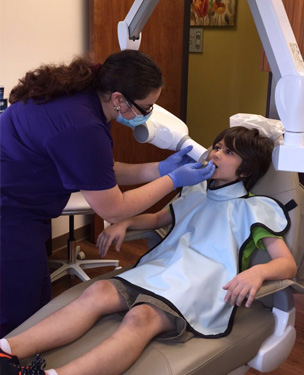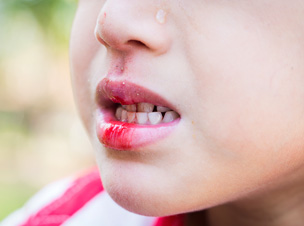Pediatric Dental Emergencies
 In Case of Emergency
In Case of Emergency
Injuries to the mouth, face, and teeth are common in children. Remaining calm and taking swift action will help minimize the damaging effects of the injury and lessen your child's discomfort. If your child has hit his/her head and lost consciousness—even for a brief moment—take them to the emergency room immediately.

 Broken Tooth
Broken Tooth
Gently clean the injured tooth to remove any debris. Place a cold compress on the face in the area of the broken tooth to minimize lip or facial swelling. If you can see bleeding coming from inside the tooth, please call the dentist immediately.
 Knocked Out Tooth
Knocked Out Tooth
Permanent Teeth: Find the tooth! Do not grab the tooth by the root. If the tooth has debris, gently rinse it with water. Try to replace the tooth into the socket. Have the child hold the tooth in place by closing on a gauze or washcloth. If it is not possible to replace the tooth, place the tooth in a cup of milk or saline water and take your child to see the dentist immediately. It is preferable to see the child within 30 minutes of the incident.
Primary (Baby) Teeth: Do NOT place the baby tooth back inside the socket because of the risk of damaging the permanent tooth underneath. Take your child to the dentist for a follow up. If you are concerned about esthetics, a "Pedo Partial" can be used to replace the missing baby teeth.
 Toothaches
Toothaches
Toothaches are caused either by a large cavity approaching the nerve of the tooth or from a fracture in the tooth itself. Along with a toothache, there may be swelling in the gums adjacent to the tooth as a result of an abscess formation. This type of dental infection can be treated briefly with several approaches. The first is to make sure the area is maintained clean by meticulous tooth brushing and flossing. A warm saltwater rinse 2-3 times per day can be used to treat the infection. Oral analgesics, such as ibuprofen (e.g. Advil®) or acetaminophen (e.g. Tylenol®) can also be used to relieve the discomfort. If your child is under the age of 4, however, check with a physician before administering any oral analgesics for dental pain. Do not give Aspirin to your child for a toothache. Topical anesthetics, e.g. Orajel® or Anbesol®, have limited use in treating a dental infection and toothache. These remedies are only temporary solutions to relieve the dental pain. Schedule your child as soon as possible to see the dentist.
 Bitten Tongue, Lip, or Cheek
Bitten Tongue, Lip, or Cheek
A bitten tongue, lip, or cheek can occur after a dental procedure where local anesthesia is used. The child may inadvertently bite him/herself because of the lack of sensation in the area. The area may become swollen, ulcerated, and have a grayish or greenish appearance; this, however, usually lasts only a few days. To help the healing process, maintain adequate oral hygiene by brushing your child's teeth at least twice per day and flossing daily. In addition, use a warm salt-water rinse 2-3 times per day and apply a topical anesthetic, e.g. Orajel® or Anbesol® to the affected area. A cold compress may also be used to help with the swelling.






